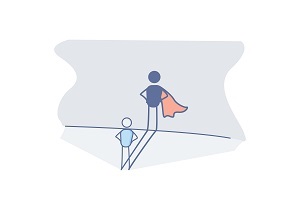Constantine Cannon Partner Gordon Schnell Published in Fortune on Why You Might Be the Next Big Whistleblower

Constantine Cannon partner Gordon Schnell was published yesterday (January 2) in Fortune on why you might become the next big whistleblower. He co-authored the piece with Amber Scorah, founder of Parallel Story, a nonprofit helping whistleblowers tell their stories.
Schnell and Scorah have worked for years helping whistleblowers bring forward information about fraud and misconduct. But not necessarily the kind of whistleblowers featured in movies or on the front page. As Schnell and Scorah put it, the typical whistleblower is not a mythical creature of sorts, predestined for the righteous cause. Instead, most of the hundreds of whistleblowers they have worked with are just everyday people.
So everyday in fact, they could be you or me. Schnell and Scorah highlight why it is so important to recognize this about whistleblowers: “If we think of a whistleblower as ‘someone else,’ we might miss wrongdoing right under our nose that could lead to someone’s death, rob us of our tax dollars, or lead to the next banking crisis or economic catastrophe.”
Schnell and Scorah offer several examples from their roster of whistleblower-clients to back up their point:
- A laboratory technician at a medical clinic who witnessed firsthand the clinic performing procedures by unqualified personnel, life-saving drugs being diluted, and patient records being doctored to conceal the clinic’s fraud. She filed a lawsuit under the False Claims Act, which allows whistleblowers to sue companies that commit fraud against the government.
- A clinical trial specialist who saw his company manipulate the clinical trial results it reported to investors on a blockbuster aging drug it was developing. He made a submission to the SEC under the SEC Whistleblower Program.
- An auto parts company executive who was concerned his company was selling a defective auto part and reported his concerns to the National Highway Traffic Safety Administration under the Motor Vehicle Safety Whistleblower Program.
- An oil tanker engineer who witnessed his captain directing the illegal dumping of oil-based pollutants into US waters. He reported this misconduct under the whistleblower provisions of the Act to Prevent Pollution from Ships.
- A for-profit college recruiter who filed a False Claims Act case against his university for recruiting violations he believed his university was engaging in that was duping government-subsidized students into enrolling for an empty education with no real career prospects.
- A veteran who worked for a company lying about its veteran-owned status so it could improperly secure government contracts set aside exclusively for veteran-owned businesses. He also brought suit under the False Claims Act.
People with everyday jobs, like most of us, who became whistleblowers. No movies that followed. No parades or fanfare. They did not become rich and famous. But they matter just as much. And as Schnell and Scorah convey, “by understanding their stories, you just might see yourself in one of them.”
And while whistleblowers can earn substantial monetary rewards for bringing their concerns forward — almost ten billion dollars in awards under the False Claims Act; more than a billion under the SEC and CFTC programs — Schnell and Scorah say for virtually all whistleblowers, it is never about the money. It is about saying something when they see something that rubs against their moral compass. Especially when the health and welfare of the public is at stake. It is to correct a problem that, as so many have relayed to Schnell and Scorah, “keeps them up at night.”
Most whistleblowers are motivated by an even more important reward than money. Refusing to stay silent in the face of fraud or injustice. Alerting the relevant agencies to investigate. And shining a regulatory light on misconduct that would have otherwise remained in the dark.
For Schnell and Scorah, the bottom line is that any one of us could be a whistleblower one day. Maybe not the subject of a future Julia Roberts film. But if faced with a company or a boss behaving badly or if exposed to something that just seems off, you just might find yourself with information the rest of the world needs to know. As Schnell and Scorah conclude: “You, the everyday employee sitting at a desk, might have the power to save a life, prevent a serious accident, avert the next financial meltdown, or stop an environmental disaster.”
Click here to read the full article in Fortune.
Read More
Tagged in: CC Lawyers, Importance of Whistleblowers, Whistleblower Answers,